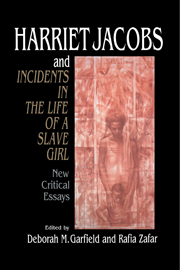Book contents
- Frontmatter
- Contents
- Introduction: Over-exposed, Under-exposed: Harriet Jacobs and Incidents in the Life of a Slave Girl
- “I Disguised My Hand”: Writing Versions of the Truth in Harriet Jacobs's Incidents in the life of a Slave Girl and John Jacobs's “A True Tale of Slavery”
- Through Her Brother's Eyes: Incidents and “A True Tale”
- Resisting Incidents
- Manifest in Signs: The Politics of Sex and Representation in Incidents in the life of a Slave Girl
- Earwitness: Female Abolitionism, Sexuality, and Incidents in the life of a Slave Girl
- Reading and Redemption in Incidents in the Life of a Slave Girl
- Harriet Jacobs, Frederick Douglass, and the Slavery Debate: Bondage, Family, and the Discourse of Domesticity
- Motherhood Beyond the Gate: Jacobs's Epistemic Challenge in Incidents in the Life of a Slave Girl
- “This Poisonous System”: Social Ills, Bodily Ills, and Incidents in the Life of a Slave Girl
- Carnival Laughter: Resistance in Incidents
- Harriet Jacobs, Henry Thoreau, and the Character of Disobedience
- The Tender of Memory: Restructuring Value in Harriet Jacobs's Incidents in the Life of a Slave Girl
- Conclusion: Vexed Alliances: Race and Female Collaborations in the Life of Harriet Jacobs
- List of Contributors
- Index
- CAMBRIDGE STUDIES IN AMERICAN LITERATURE AND CULTURE
Motherhood Beyond the Gate: Jacobs's Epistemic Challenge in Incidents in the Life of a Slave Girl
Published online by Cambridge University Press: 22 January 2010
- Frontmatter
- Contents
- Introduction: Over-exposed, Under-exposed: Harriet Jacobs and Incidents in the Life of a Slave Girl
- “I Disguised My Hand”: Writing Versions of the Truth in Harriet Jacobs's Incidents in the life of a Slave Girl and John Jacobs's “A True Tale of Slavery”
- Through Her Brother's Eyes: Incidents and “A True Tale”
- Resisting Incidents
- Manifest in Signs: The Politics of Sex and Representation in Incidents in the life of a Slave Girl
- Earwitness: Female Abolitionism, Sexuality, and Incidents in the life of a Slave Girl
- Reading and Redemption in Incidents in the Life of a Slave Girl
- Harriet Jacobs, Frederick Douglass, and the Slavery Debate: Bondage, Family, and the Discourse of Domesticity
- Motherhood Beyond the Gate: Jacobs's Epistemic Challenge in Incidents in the Life of a Slave Girl
- “This Poisonous System”: Social Ills, Bodily Ills, and Incidents in the Life of a Slave Girl
- Carnival Laughter: Resistance in Incidents
- Harriet Jacobs, Henry Thoreau, and the Character of Disobedience
- The Tender of Memory: Restructuring Value in Harriet Jacobs's Incidents in the Life of a Slave Girl
- Conclusion: Vexed Alliances: Race and Female Collaborations in the Life of Harriet Jacobs
- List of Contributors
- Index
- CAMBRIDGE STUDIES IN AMERICAN LITERATURE AND CULTURE
Summary
In 1837, at the Anti-Slavery Convention of American Women, Mrs. A. L. Cox put forth a resolution proclaiming that “there is no class of women to whom the anti-slavery cause makes so direct and powerful an appeal as to mothers” Responding to this appeal, the resolution calls for women to “lift up their hearts to God on behalf of the captive, as often as they pour them out over their own children in a joy with which ‘no stranger may intermeddle.’” The same resolution warns women to “guard with jealous care the minds of their children from the ruining influences of the spirit of pro-slavery and prejudice, let those influences come in what name, or through what connexions they may.” The dual mandate here – for hearts to be lifted upward to God's purifying realm, and for jealous care to be directed outward against Man's corrupting realm – points us in turn to what Jean Fagan Yellin calls the “double tale” in Harriet Jacobs's 1861 narrative Incidents in the Life of a Slave Girl. As Yellin notes, Jacobs dramatizes “the triumph of her efforts to prevent her master from raping her,” but she also presents the story of “her failure to adhere to sexual standards in which she believed.” In other words, although Jacobs might hope that the story of her “triumph” would lift up her readers' hearts, she knew also that her “failure” would cause her readers to guard those same hearts with jealous care, and to turn God's realm against Jacobs in judgment.
- Type
- Chapter
- Information
- Harriet Jacobs and Incidents in the Life of a Slave GirlNew Critical Essays, pp. 179 - 198Publisher: Cambridge University PressPrint publication year: 1996
- 1
- Cited by



